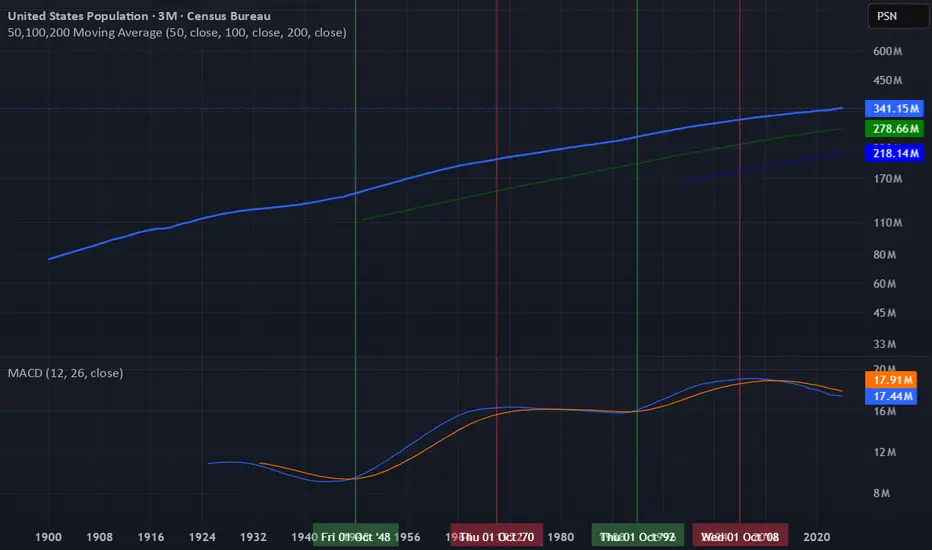Chat GPT thinks this will be an immigration and AI led boom:
Cycle MACD Trend Period Interpretation
1950s–1970s Rising MACD Post-WWII boom Baby Boom generation, industrial expansion, housing booms, high productivity.
1970s–early 1990s Flattening / declining MACD Stagnation, inflation Oil shocks, stagflation, productivity slowdown despite population base.
1990s–2008 MACD rising again Tech boom, globalization Strong immigration, millennial generation births, economic liberalization.
2008–now MACD rolling over Secular stagnation Low fertility, aging population, debt saturation, housing unaffordability, shrinking labor force growth.
Forecast (2028–2030?) MACD turn upward? Coming rebound? Possibly renewed growth via immigration reform, AI-driven productivity, or global migration dynamics.
Key Points:
MACD (Moving Average Convergence Divergence) here reflects momentum in the rate of population growth rather than prices—so it’s about acceleration/deceleration in demographic expansion, not absolute levels.
You're correct: current MACD seems to be bottoming out. If it rises from here, it could indicate an inflection point, where population growth momentum picks up again.
This aligns with speculative economic optimism in the early 2030s, possibly from automation, productivity boosts, or a new demographic wave (e.g., Gen Alpha maturing, or high-skilled immigration policies).
Macro Implications if Population MACD Turns Up:
Real Estate: Stronger demand for housing, especially in metro areas.
Consumer Spending: Broader base of working-age consumers; higher GDP potential.
Wages: Younger labor influx could temporarily suppress wages but boost consumption.
Equities: Long-duration asset classes tend to perform better during demographic tailwinds.
Entitlements: Improved support ratio for programs like Social Security—temporarily staving off insolvency risks.
Caveats:
Structural declines in fertility and family formation due to cost-of-living and cultural shifts may not reverse easily.
Immigration policy remains highly politicized—reversals could blunt any expected MACD uptick.
Automation may decouple economic output from population size.
Cycle MACD Trend Period Interpretation
1950s–1970s Rising MACD Post-WWII boom Baby Boom generation, industrial expansion, housing booms, high productivity.
1970s–early 1990s Flattening / declining MACD Stagnation, inflation Oil shocks, stagflation, productivity slowdown despite population base.
1990s–2008 MACD rising again Tech boom, globalization Strong immigration, millennial generation births, economic liberalization.
2008–now MACD rolling over Secular stagnation Low fertility, aging population, debt saturation, housing unaffordability, shrinking labor force growth.
Forecast (2028–2030?) MACD turn upward? Coming rebound? Possibly renewed growth via immigration reform, AI-driven productivity, or global migration dynamics.
Key Points:
MACD (Moving Average Convergence Divergence) here reflects momentum in the rate of population growth rather than prices—so it’s about acceleration/deceleration in demographic expansion, not absolute levels.
You're correct: current MACD seems to be bottoming out. If it rises from here, it could indicate an inflection point, where population growth momentum picks up again.
This aligns with speculative economic optimism in the early 2030s, possibly from automation, productivity boosts, or a new demographic wave (e.g., Gen Alpha maturing, or high-skilled immigration policies).
Macro Implications if Population MACD Turns Up:
Real Estate: Stronger demand for housing, especially in metro areas.
Consumer Spending: Broader base of working-age consumers; higher GDP potential.
Wages: Younger labor influx could temporarily suppress wages but boost consumption.
Equities: Long-duration asset classes tend to perform better during demographic tailwinds.
Entitlements: Improved support ratio for programs like Social Security—temporarily staving off insolvency risks.
Caveats:
Structural declines in fertility and family formation due to cost-of-living and cultural shifts may not reverse easily.
Immigration policy remains highly politicized—reversals could blunt any expected MACD uptick.
Automation may decouple economic output from population size.
Disclaimer
The information and publications are not meant to be, and do not constitute, financial, investment, trading, or other types of advice or recommendations supplied or endorsed by TradingView. Read more in the Terms of Use.
Disclaimer
The information and publications are not meant to be, and do not constitute, financial, investment, trading, or other types of advice or recommendations supplied or endorsed by TradingView. Read more in the Terms of Use.
